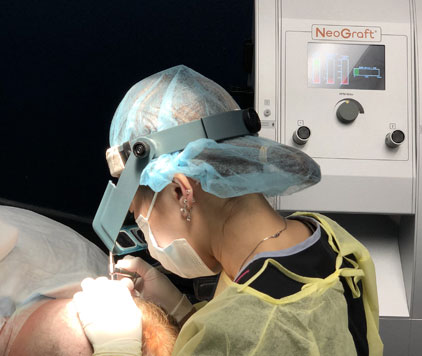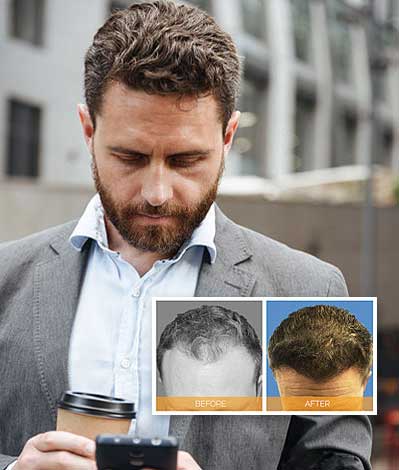SURGICAL HAIR RESTORATION – HAIR TRANSPLANTS FOR MEN & WOMEN – RALEIGH, NORTH CAROLINA
SURGICAL HAIR RESTORATION FAQ


FAQ: HAIR TRANSPLANT SURGERY FOR HAIR RESTORATION
WHAT YOU SHOULD KNOW ABOUT SURGICAL HAIR RESTORATION
What causes hair loss?
The most common cause of hair loss is inheritance. Men and women inherit the gene for hair loss from either or both parents. Men are most commonly affected by the inherited gene as the hormone, testosterone, activates the genetic program causing loss of hair follicles. Currently there is no known method of stopping this type of hair loss. The age of onset, extent, and rate of hair loss vary from person to person. Severe illness, malnutrition, or vitamin deficiency can accelerate this process.
How Can I Know if I am an appropriate candidate for hair transplant surgery?
Our goal for each patient is to try and achieve as much naturalness and density as possible. We feel these two goals are best achieved when the plan is individualized for each patient. There are a host of factors that must be taken into account with each patient before formulating the best plan: Some of the more important factors are: the patient’s age, the hair-to-skin color contrast, the caliber of the hair, the patient’s goals for later styling, and, perhaps most important, the ratio of available donor hair in relation to the recipient area in need of coverage. This can only be achieved in the context of an initial consultation and examination, which is offered free of charge and without obligation.
Do hair transplants really work?
Yes. The transplanted hair is removed from one area of the body (donor site) and transferred to another (recipient site). The transplanted hair maintains it’s own characteristics; color, texture, growth rate, and curl, after transplantation and regrowth. The vitality of the grafted follicle is maintained by the rich blood supply to the scalp. We have found that hair grows from the scalp in groups of one, two, and three hair follicles. We transfer these groups of follicles after eliminating the excess surrounding fatty tissue. This allows the grafts to be placed closer together resulting in a denser and more natural result.
What can be expected after hair restoration surgery?
The post-operative course will depend on adherence to the instructions given after surgery. Small scabs will form on the scalp at the graft sites. Generally speaking, these scabs disappear in 4-7days. Shampooing can be resumed 24 hours after surgery. The suture (stitch) used in the donor area is undetectable as it is completely covered by your existing hair. An appointment will be made for the suture to be removed approximately one week after surgery. Each patient’s case is individual and each patient should follow specific instructions provided by the doctor after the procedure.
Are hair transplants painful?
Most people are surprised at how little pain there is during the hair transplant procedure. Some discomfort is to be expected as the anesthetic is injected into the scalp. Once the skin is anesthetized, there is no pain.
What will it look like after the procedure?
The grafts form small scabs in the days after the procedure. If one has enough surrounding hair, these scabs can be camouflaged with creative styling. If not, the small scabs may be visible but do not attract much attention. By keeping the scalp moist, the scabs usually come off in about a week or so.
When can I go back to work?
Depending on the type of procedure you have done and the type of work you do, it is often possible to go back to work the next day. We will discuss this with you during the consultation.
Are hair transplants expensive?
Hair transplantation is more expensive than a hair piece or some alternative treatments. However, considering that the results are permanent, most people consider it a good investment in their future happiness.
How many sessions will be required?
The number of the sessions will depend on the 1) area of scalp treated 2) the number and size of grafts used and 3 ) the density which the patient desires 4) the individual characteristics of the patient, e.g., coarse hair will provide a denser look than fine hair. The estimate of the number of sessions can be discussed during the consultation with your surgeon.
Is There Anything Else I Can Do for My Hair Loss?
There are several therapies that are available to you in addition to hair transplants. First of all, for men there is Propecia. This is a medication specifically designed for hair loss in the crown and mid-scalp area. This medication has proven that taken daily it will slow and stop hair loss in these areas. Secondly, the use of topical Rogaine is available for men and women. This is also applied to the mid-scalp to crown area to stop further hair loss.
Can Hair Transplants Help Women?
Hair transplants women are finding can have great success if they are candidates for hair transplants surgery. Women can have specific patterns of hair loss, hairline recession, and general thinning on the top of the scalp. These hair loss patterns can all be treated successfully by hair transplant surgery. The women’s donor area in these cases is unaffected by the hair loss pattern and makes them an ideal candidate for hair transplant surgery.
What is Low Level Light Laser Therapy?
We have known for a long time that increasing the blood f low and circulation to an area can aid in healing of the area. These same principles hold true for stimulation of hair follicles. This is exactly how low-level light therapy works. It increases circulation of blood, oxygen, and stimulates cells to become more active at the hair follicle. By creating this environment, the hair cycle will continue on with the growth cycle. This helps prevents miniaturization of hairs that otherwise would eventually die and fall out. Additional information on Laser Hair Therapy may be found here.
Our practice is pleased to present flexible payment plans through Lending Club Patient Solutions. Enjoy a selection of flexible plans with low fixed rates and monthly payments, no upfront payment, and no prepayment penalty. It’s easy to calculate your potential monthly payments. Simply complete a short application which displays fixed rates and monthly payments available for Extended Plans, all without impacting your credit score. For more information, simply ask a team member or visit: lendingclub.com/patients.

